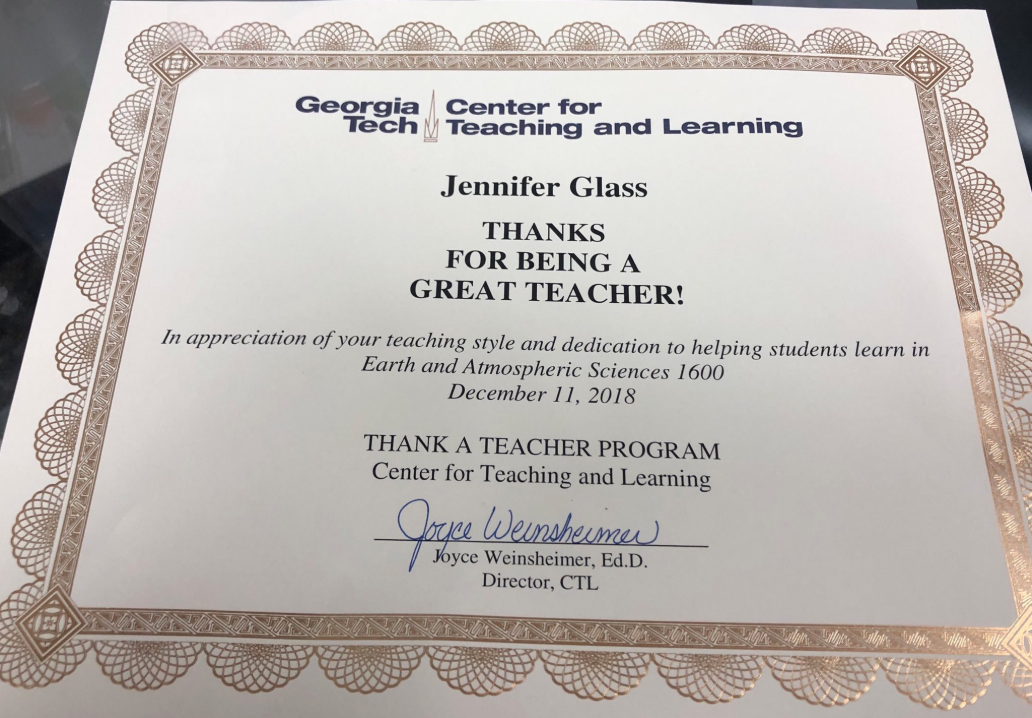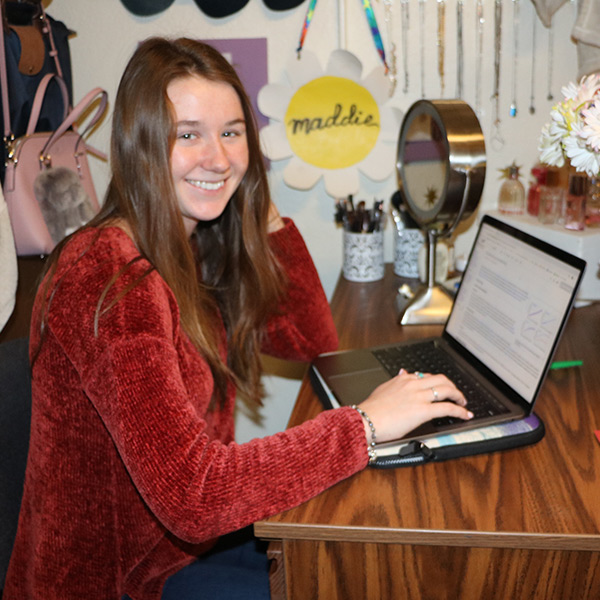It’s not every day that a student takes the time to officially thank their professor for a great project. But that’s what Madeleine Hardt, Dr. Jennifer Glass’ student at Georgia Institute of Technology, did after learning how to write Wikipedia articles as a class assignment. The thank you came in the form of a certificate of appreciation issued through Georgia Tech’s Center for Teaching and Learning. In conjunction with the certificate, Madeleine wrote:
Dear Dr. Glass, Thank you for being such an enthusiastic teacher throughout the year, and for challenging our class to go out of our comfort zones with the Wikipedia project. I thoroughly enjoyed each lesson as well as the project, and I am so excited for EAS [Earth and atmospheric science] classes to come. Have a wonderful break!

“It was really nice that she spent the time to do that,” Dr. Glass shared with Wiki Education in a phone interview.

Image courtesy of Madeleine Hardt. Rights reserved.
The sentiment behind Madeleine’s initiative isn’t unique among the other students in Dr. Glass’ Earth and atmospheric science course. Student reflections after the course show great enthusiasm and a lot of important and self-identified learnings.
But Dr. Glass wasn’t sure how her students would take to the assignment at the beginning of the term. She noted that most of them have probably been told never to use Wikipedia at one time or another. “They must have been thinking ‘What the heck is this?'” She joked. Post-assignment presentations told a different story, though. Students were eager to share their take-aways and enthusiasm about their work. According to the students themselves, the assignment gave them:
- An understanding of how Wikipedia works
- Skills to analyze digital sources of information for accuracy
- A deeper understanding of course topics
- Collaborative writing skills to produce reliable information for the public
- Pride that they’ve contributed to something larger than themselves
Critical media literacy
Of the many learnings that students identified in the assignment, critical media literacy – or the ability to understand an online resource that they use all the time (and have been told not to use) – is a big one. One student found that although “Wikipedia in general has a reputation for being unreliable, when I actually read through the article, I found this to be true only for information that did not have citations.” Another student remarked, “I learned that there has to be quite a bit of work for every sentence in a Wikipedia article.”
“Over the course of the semester they realized Wikipedia is more credible than they originally thought,” said Dr. Glass. “But they also know they have to be careful that the topic they’re reading has citations. Now they will look at Wikipedia articles they read, look for citations, and check what kind of citations.”
Research
Students refined their research skills as a part of the assignment, as well – familiarizing themselves with different types of sources and the process of synthesizing information. Dr. Glass also took the opportunity to discuss information privilege with the class. “I believe in the open access movement and democratizing science,” shared Dr. Glass. “Those are also the values of Wikipedia. And I really want in Academia, instead of being in our ivory towers, to work to make our writings much more public. We have access to all these subscription-based journals, and we can be the go betweens by having our students translate that information into Wikipedia.”
Science communication
The Wikipedia assignment is a great fit for teaching science communication, as students are required to speak about complex topics they’re learning about in terms a general audience will understand. Students are in a position to do this translation work well, as they were recently unfamiliar with these topics themselves. “In the initial read through of the article, I mainly focused on what I could learn from it,” said another student in their reflection. “If I got confused with a concept that was listed, I would make a note to improve that part.”
“From contributing to Wikipedia, I learned the amount of work required to gather technical information and put it in an easily readable form,” remarked another student.
Collaborative writing
Students participated directly in Wikipedia’s methods of producing information collaboratively. And they reflected on what that means for accuracy of information in general. “I learned the importance of peer review,” one reflection read. “Without peer review, articles may only show one person’s perspective. I also learned the importance of thorough research. It allows for a strong and complete article that shows multiple points of view.” Another student said that the assignment offered a “great method for learning more about a topic through editing and modifying a collaboration of information.”
Pride & motivation
As far as how the assignment compares to others, students had a lot to say. For one, the nature of writing for Wikipedia requires more revisions than students were necessarily used to. One student noted that the assignment involved “constant editing instead of writing it once and submitting it.” And even though students contributed only sentences or paragraphs of information at a time, a lot of work goes into researching, sourcing, and synthesizing that information into something Wikipedia-ready. “Editing Wikipedia felt like I was writing a research paper,” said one student.
Many found they were up to this new challenge, since their work could have a real impact. “It’s easy to just write a paper about a topic, but this is a bigger picture,” said one student. Another remarked that their work “affects more people than just a teacher” and “connects you to a community and something to do in the future.”
So while some found the assignment “more tasking and time consuming” than the average research paper, they ultimately found it “more fulfilling” too.
We’ve found that students feel more motivated when they see their work has a real-world effect. Dr. Glass’ student reflections echo that enthusiasm:
“I liked the project because the work isn’t going to waste. Now I can follow how many views my article has received, for example. Thousands can learn from my research.”
“The Wikipedia assignment has been significantly different than other assignments because it actually serves a purpose. Most assignments tend to be busy work and seem like a waste of time, but this assignment actually benefits society as a whole in addition to helping me learn.”
“I think it is important that people continue to expand on environmental and climate-related topics. If issues like my own topic aren’t covered, people may not think that they are as important.”
“Pollution prevention is crucial with the increasing global warming threat. By performing research on this topic, I have created a resource that others can use to implement pollution prevention processes.”
Intuitive, easy to incorporate into curricula
Dr. Glass says she’s already teaching with Wikipedia again in her Spring 2019 graduate-level course. She has appreciated the intuitiveness of the Dashboard – our tool that helps instructors assign Wikipedia trainings to their students and track their work.
“Students initially think editing Wikipedia will be harder than they think,” said Dr. Glass. “But I ask them ‘Have you done the trainings?’ and by the time they get through those, everything pretty much makes sense. And we’re making good headway on some of the environmental science pages.”
“The students have really bought into this and I’ve been encouraging my colleagues to do this more and more. We’ve been very impressed with the Dashboard and how easy it was to use, so I know several other instructors are doing it at Georgia Tech.”
“Everyone agrees it’s way more interesting than a term paper. I think I’ll never go back to term papers – and instead always do something interactive like this.”
Interested in teaching with Wikipedia? Visit teach.wikiedu.org for all you need to know to get started. Or reach out to contact@wikiedu.org with questions.
